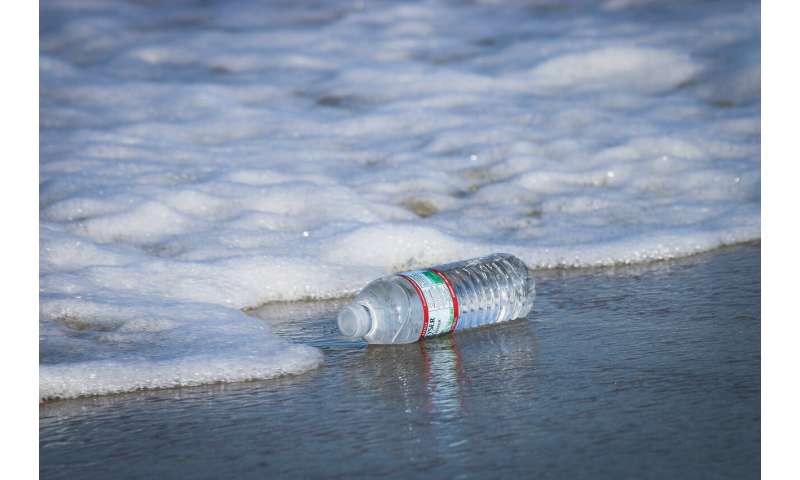
A team of researchers from Australia, Canada, the U.K. and New Zealand has found that some fish that eat microplastics are more likely to take risks, and because of that, wind up dying younger. In their paper published in the journal Proceedings of the Royal Society B, the group describes their study that involved capturing young fish, feeding them microplastics and then returning them to the sea to learn more about what eating plastics does to them.
Over the past several decades, scientists have become aware of a world-wide pollution source—plastics and microplastics. Multiple studies have been conducted to find out what sort of impact such plastics are having on the environment and the creatures that wind up eating it—including people. In this new effort, the researchers wondered what sort of impact microplastics might be having on fish living in the Great Barrier Reef.
To learn more about such an impact, the researchers caught a mass of young Ambon damselfish living among the reefs. They brought them back to their lab and placed them in water-filled tanks for four days. During that time, the fish were fed shrimp, which they normally eat in the wild. Also, microplastics were added to half the tanks, which the fish also ate. Once the fish were dumped back into the ocean in the same area where they had been captured, the researchers tracked them to see if eating microplastics had any noticeable impact on them.
The researchers found that while just a fraction of the fish that did not eat the microplastics were captured and eaten by predators in the 72 hours after their release, all of those that did eat the microplastics were consumed by predators.
Careful observation of the fish revealed the reason—those fish that had eaten the microplastics were not only more active than those not given the microplastics, they also exhibited more risky behavior, such as venturing out into open waters.
The researchers suggest the reason for the change in behavior was hunger—those fish that had consumed the plastic had bellies full of plastic but it was not providing them with any nutrition. They behaved as if they were starving to death, which put them at a much higher risk of being spotted and eaten by predators. They also noted that the impact was more noticeable in areas where the coral was degraded.
© 2020 Science X Network
Citation: Fish that eat microplastics are found to take more risks and die younger (2020, October 28) retrieved 28 October 2020 from https://ift.tt/2J6P0B4
This document is subject to copyright. Apart from any fair dealing for the purpose of private study or research, no part may be reproduced without the written permission. The content is provided for information purposes only.
"eat" - Google News
October 29, 2020 at 12:13AM
https://ift.tt/2J6P0B4
Fish that eat microplastics are found to take more risks and die younger - Phys.org
"eat" - Google News
https://ift.tt/33WjFpI
https://ift.tt/2VWmZ3q
Bagikan Berita Ini














0 Response to "Fish that eat microplastics are found to take more risks and die younger - Phys.org"
Post a Comment